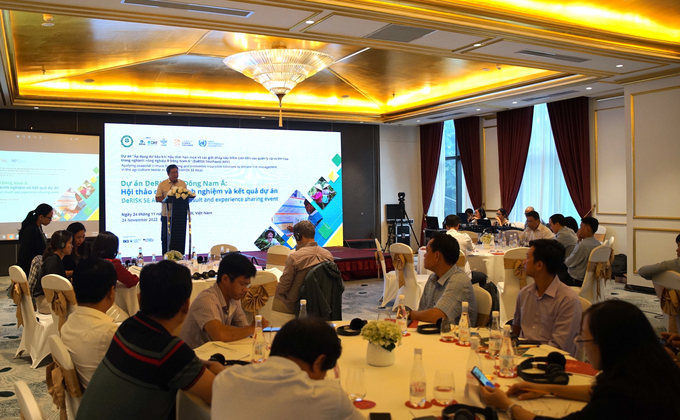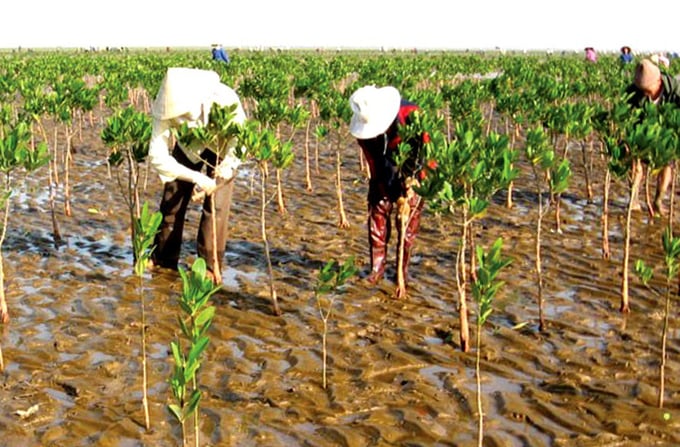November 25, 2025 | 07:22 GMT +7
November 25, 2025 | 07:22 GMT +7
Hotline: 0913.378.918
November 25, 2025 | 07:22 GMT +7
Hotline: 0913.378.918
The workshop on sharing experiences and results of the project for "Applying seasonal climate forecasting and innovative insurance solutions to climate risk management in the agricultural sector in the Southeast Asia" (DeRISK SE Asia) was recently held in Hanoi.
Since its inception in 2018, the project has developed multiple climate risk management systems that apply technological advances in seasonal climate forecasting and innovative insurance solutions, thereby protecting smallholder farmers and businesses in key agricultural value chains in Vietnam, in response to the economic losses and damages caused by climate change. The DeRISK SE Asia project is led by the World Meteorological Organization (WMO) and implemented by the University of Southern Queensland (USQ), the International Union for Biodiversity and the International Center for Tropical Agriculture (CIAT), in addition to the cooperation of various central and local agencies under the Ministry of Agriculture and Rural Development.
Climate change and extreme weather events in Vietnam increase the vulnerability of smallholder farmers and threaten agricultural livelihoods. Namely, the 2016 El-Nino event, severe drought and saltwater intrusion has affected production in the Mekong Delta, causing serious economic losses. On the other hand, the current climate information service cannot fully meet the needs of the local people, which can lead to unsuitable decisions regarding the selection of plant varieties as well as the method to nurture them.
The Agricultural Weather Bulletin was introduced as part of the DeRISK SE project, taking into account different time periods to assist farmers in making more appropriate decisions; which will consequently reduce production costs and increase crop yield efficiency.

Overview of the workshop on sharing experiences and results of the project for "Applying seasonal climate forecasting and innovative insurance solutions to climate risk management in the agricultural sector in the Southeast Asia". Photo: Linh Linh.
The Agricultural Weather Bulletin is produced based on seasonal, monthly or 10-day forecasts. The Bulletin is built on the interaction between stakeholders in the value chain including hydro-meteorological forecasters, agricultural staff, irrigation staff and representative farmers; this will help to produce, clarify and disseminate specific recommendations for the agricultural planning and decision-making process. Additionally, the Bulletin provides timely seasonal and weather recommendations that are suitable for each locality to help farmers reduce production costs, mitigate damage caused by climate changes, as well as increase crop productivity and income.
According to reports from the project, the pilot models in Tien Giang province in the Mekong Delta and Ninh Thuan province in the South Central Coast has yielded significant results.
With timely updates from the Agricultural Weather Bulletin, farmers in the pilot areas reported that the amount of pesticides used has decreased by nearly 1,264,000 VND for every hectare. Moreover, the yield is 322 kg/hectare higher on average compared to households outside the model. Consequently households in the pilot areas have earned 2,751,000 VND/hectare higher in income compared to those outside the model.
Eight provinces and cities with 351 communes across the Mekong Delta and South Central Coast are currently implementing the Agricultural Weather Bulletin. This project has also received support from other provinces and regions.
Over 130,000 farmers have accessed the Agricultural Weather Bulletin; an estimated 520,000 farmers have benefitted from the Bulletin, contributing to improved livelihoods and resilience to climate change.
Experts at the workshop have discussed about the relationship and coordination between the Agricultural Weather Bulletin and CS-MAP for effective weather risk management at the provincial, district and commune levels.
Regarding CS-MAP, Mr. Le Thanh Tung, Deputy Director of the Department of Crop Production under the Ministry of Agricultural and Rural Development said that the methodology for building the Climate Risk Map and adaptation plan was developed by CCAFS and the Department of Crop Production from 2017 to 2019. The CS-Map has been successfully applied in 13 provinces in the Mekong Delta during the winter-spring crop of 2019 to 2020.
CS-MAP is a participatory approach by national experts and local officials to identify climate-related risks based on evidence from science and local knowledge; identify potentially affected areas and their level of risk; improve the proposed adaptation measures; develop integrated adaptation plans in rice production from the regional to the provincial level.

The Agricultural Weather Bulletin is a co-development process with key stakeholders in the climate service value chain from production, interpretation, dissemination to utilization.
“CS-MAP and the Agricultural Weather Bulletin have given power to effectively organize production in localities; and they are an effective tool to arrange suitable schedules for seasons and crops”, said Mr. Tung.
Ms. Vo Thi Kim Phuong, Deputy Director of Tien Giang Sub-Department of Crop Production and Plant Protection, informed that the Department of Crop Production is coordinating with CIAT to develop the Agricultural Weather Bulletin into a process. The Department has recognized this project as a technological advance to maintain within the local news outlet. The Agricultural Weather Bulletin will subsequently be incorporated into the CS-MAP iunder MARD's Decision No. 3444 regarding the Action Plan to implement the National Green Growth Strategy from 2021 to 2030.
The Office of the Southern Department of Crop Production has issued a regional directive on the application of Agricultural Weather Bulletin in the Mekong Delta region. The Department of Crop Production and the DeRISK project are planning to expand the implementation of the Agricultural Weather Bulletin in the participating provinces as well as develop additional models to maintain and replicate with the assistance of relevant government units.
In the long-term plan to maintain the CS-MAP and the Agricultural Weather Bulletin, the Department of Crop Production will coordinate with stakeholders to enhance training, capacity building at all levels, develop and integrate the Agricultural Weather Bulletin on a digital platform, while maintaining a relevant and participatory approach to the stakeholders, and based on the needs of the users.
Translated by Nguyen Hai Long

(VAN) Green transition is crucial for the Mekong Delta amid climate change and stricter standards, offering a path toward sustainability.

(VAN) Dong Thap promotes agricultural restructuring, forms large specialized farming zones, raises the value of agricultural products and develops toward ecological and high-tech directions.
/2025/11/22/4018-4-213342_747.jpg)
(VAN) The Mekong Delta Agricultural Experts Club has attracted 143 experts and researchers to participate in providing consultancy and contributing initiatives to the development of one million hectares of high-quality rice.

(VAN) Ca Mau’s development of OCOP products opens a path to increasing cooperatives value, helping boost income, expand markets, and affirm collective economy's role.

(VAN) Turning seemingly ordinary coconut shells into unique jewelry and artwork, Nguyen Bang Nhi spreads the value of local culture through her brand, Cocohand.

(VAN) Results from the Sustainable Durian Model Project in Dak Lak have confirmed the critical role of Yara Viet Nam in transferring advanced nutritional solutions to farmers.

(VAN) In Tuyen Quang province, livestock farmers have introduced effective models and innovative practices that significantly strengthen African Swine Fever prevention and control efforts.